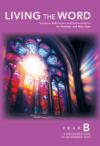Scripture Study for
The Epiphany of the Lord
Isaiah 60:1–6 / Psalm 72:11 / Ephesians 3:2–3a, 5–6 / Matthew 2:1–12
<< Back to LECTIONARY RESOURCES
Understanding the Word
By Br. John R. Barker, OFM
The beginning of the book of Isaiah presents a vision in which, one day, Zion will attract “all nations” seeking to learn from the God of Israel (Isaiah 2:1–4). Here too, toward the end of the book, we hear a similar proclamation in an oracle from the post-exilic period, during which the returnees from exile are slowly rebuilding Jerusalem and a new temple. The hopeful vision announces that because of God’s presence (“the glory of the Lord”), the city is filled with light shining forth over the whole earth, presently darkened (by ignorance or violence?). Once again, we hear that nations will be attracted to Jerusalem because of the God who dwells within, bringing with them tribute to God, whose sovereignty they acknowledge, whose praises they proclaim.
The reading from Ephesians explores the extension of God’s relationship with Israel to include, in Christ, Gentiles also. Here the emphasis is on God’s “outreach” to the nations. Paul has been entrusted with the message of God’s grace. The content of that grace is precisely that Gentiles are now called to join with Jews as heirs of God’s ancient promises. Like the original promises to the Jews, this inheritance has not been earned, but is founded solely on the graciousness of God, whose benevolence is now extending beyond ethnic Israel to include all those who become members of the body of Christ.
The magi, wise men and astrologers who were part of the priestly class in Persia, would have shared the cultural belief that the birth of kings was “announced” through celestial phenomena, such as the “rising of a star.” Thus, they arrive, having ascertained the birth of a Jewish king. Herod, a Jewish client king of the Romans, is understandably threatened. Having determined exactly where such a newborn king might be found, he slyly sends the magi to search him out for him. The gifts of the magi are costly and appropriate for a king; they do not seem particularly dismayed to find the newborn king sleeping in a manger.
